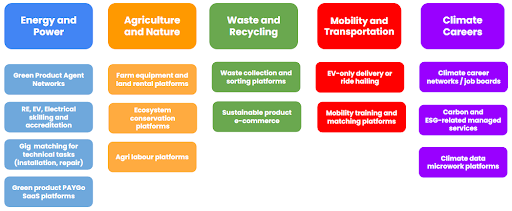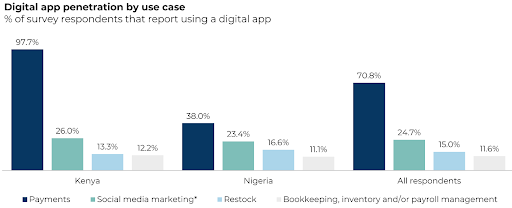Editor’s note: This is the second part of a two-part contribution from the Jobtech Alliance at Mercy Corps and BFA Global.
This first part (Where are all the jobs in Africa?) drew attention to the crisis of missing jobs across Africa, and highlighted the role jobtech plays in the continent’s labor markets.
This second part explores the opportunities for jobtech platforms in Africa in the near term and was co-authored by Jobtech Alliance Venture Partner Nick Markham and Program Director Chris Maclay.
Economies across Africa might be growing, but their populations are growing even faster, and they aren’t yet creating enough jobs to sustain and meaningfully engage them.
Jobtech platforms — digital platforms that enable, facilitate, or improve users’ ability to access and deliver quality work — will play a big role in labor markets across Africa over the next decade.
Innovation in jobtech will determine if the sector can meet the pressing demands of the African job market and capitalize on its demographic advantage.
As I wrote in ‘Where are all the jobs in Africa,’ jobtech is a fundamentally difficult sector. But it contains a number of opportunity spaces for innovation that we’re excited about and hope to see more people building in.
Where we see jobs emerging
Demand for labor is the engine that drives job creation across Africa.
Without sufficient demand, even the most innovative platforms will struggle to find product-market fit and generate sustainable employment.
However, African markets are generally characterized by severely fractured labor markets with a fundamental lack of demand for labor, driven by low purchasing power across the continent.
So, the most impactful jobtech platforms — both commercially and socially — over the next decade will be those that either have sizeable demand now or can create demand by turning non-consumption of labor into consumption (by tapping into global markets, by packaging labor in new ways as Uber did for taxis, for example, or by enabling entrepreneurs to earn more).
Based on this, we’ve identified ten jobtech sectors that we believe to be the most promising in the near-term.
Social Commerce & Agent Networks
Social commerce and agent networks are pioneering community-driven economic models that effectively blend digital tools with real-world networks, reflecting Africa’s unique social structures.
These platforms create substantial job opportunities, particularly for women, by integrating community-based selling, distribution networks, and agent-based outreach, thus driving sustainable job creation at scale. We’re particularly interested in:
- Dropshipping and Digital Affiliate Platforms: Platforms like Tendo with low-price discoverability, robust infrastructure rails, and community-based selling features.
- Agent Superapps: Platforms that leverage agent networks for distributed sales. Given the costs of establishing and maintaining agent networks, interoperable agent models such as agent superapps (like Avunja) or agent-as-a-service models (like Opareta) have huge growth potential. Read more about these models here.
- Community Group Buying Apps: Platforms like Kapu, that leverage trusted local agents to aggregate demand for common household items.
Digital Creative Industries
Africa’s creative economy is fast-growing and employs approximately 2.4 million people today, the majority of whom are between 15-29.
There is tremendous potential in commercializing the continent’s unique cultural assets via digital content creation, fashion, influencer-driven businesses, and more. We’re particularly excited by:
- Creators as Businesses: Platforms like Selar offer business management, distribution, and monetization tools for digital content creators. Competing with global discovery platforms is challenging, so we tend to focus on platforms that empower African creators directly. Read more about Selar here.
- Influencer Platforms: Platforms like Wowzi or Twiva that connect African influencers with monetization opportunities and brand partnerships.
- Creator-Adjacent Career Platforms: Platforms like Filmmakers’ Mart that connect creators with local service providers, such as photographers, production crews, and location managers.
Green Jobs
With the global push towards decarbonization, coupled with a youthful population, an emerging manufacturing sector, and rich mineral resources, Africa is well-positioned to become a leader in green jobs.
And jobtech platforms will play a major role in many of these value chains:

Taking a platform lens to green jobs.
We’re particularly interested in:
- Technician Platforms in Energy: Platforms like Instollar that both train and match technicians with green job opportunities.
- Dedicated Green Product Agent Networks: Platforms like InfiniBranches that facilitate the sales, distribution, installation, and consumer financing of green products and services.
- Climate Career Platforms: Platforms like the Energy Talent Company that facilitate training, accreditation, skill development, and employment matching in emerging green economies.
Micro-Enterprises
Africa’s 44 million MSMEs are the backbone of the continent’s economy, driving 60% of employment and 38% of GDP.
Digital services are increasingly being integrated by these micro-entrepreneurs in order to gain access to operational efficiencies, to optimize the supply chain, to accept and make payments, to reach new markets, and more.

Source: DFS Lab.
This phenomenon is only going to grow over the next decade, as digital platforms provide increasingly valuable infrastructure which enables micro-enterprises to thrive. We’re particularly interested in:
- Digital Infrastructure Platforms: Storefronts, catalog builders, and sales services platforms that help SMEs digitize, reach new customers and access new markets. Like Catlog or Sukhiba.
- Vertically integrated platforms: Platforms that build deep within individual microenterprise verticals, solving for multiple market failures in the value chain. Like Fitted for tailors or Orda for small restaurants.
- eCommerce Enablement Platforms: Platforms offering fulfillment, logistics, and last-mile delivery solutions, similar to Jemla or Leta.
International Trade
Given demand constraints domestically, platforms that facilitate cross-border transactions can significantly boost job creation by expanding the customer pool for African micro-enterprises.
In addition, facilitating cross-border trade enhances economic integration, supporting the growth of regional supply chains and ultimately creating lots of jobs in adjacent sectors, from manufacturing to logistics. We’re particularly interested in:
- Export Facilitation Platforms: Platforms that assist SMEs in navigating export regulations, logistics, and market entry strategies, boosting their international sales.
- Cross-Border E-commerce Platforms: Platforms like Kwely or Anka that enable seamless cross-border e-commerce transactions, expanding market reach for local businesses.
Non-traditional Outsourcing
Continuing on the theme of tapping into global demand, with a young, educated workforce, favorable time zones, linguistic diversity as well as 200 million English speakers, and rapidly improving infrastructure, Africa is well-positioned for outsourcing the roles of the future.
While freelancing has long been seen as a great opportunity for Africans, we think that managed services — where an intermediary company is able to both lead on commercial engagement (finding the jobs), as well as using the significant margins for recruitment, vetting, training, and quality control — is the growth area for the continent.
We’re particularly interested in:
- Niche specialized sectors: This could involve ‘augmented staffing’ platforms like Tana that train and place talent in global companies or ‘dev shops’ like iTalanta that manage entire tech projects for global clients.
- Next-gen BPO platforms: Platforms, like AfricaAI, that offer back-office support services such as data annotation, legal research, GenAI labeling and LLM model training.
Freelance and Digital Gig Work
While freelance roles can be difficult entry points into global work for young Africans due to global competition and downward pricing pressure, there are still opportunities for gig-based digital work.
- New Microwork Platforms: Platforms offering services such as data annotation, data collection, and app prototyping like Rwazi.
- Specialized or Verticalized Freelance Platforms: Platforms catering to specific niches (telehealth, tutoring, creative sectors).
Domestic Care Work
The ILO predicts that 150 million new care jobs alone will be created by 2030. Women in care roles like nannying earn 50% more than cleaners so there’s also huge livelihood potential if these sectors can be formalized. While these platforms have largely struggled to take off across the continent so far, we still see significant potential here.
- Home Cleaning and Domestic Assistance: Platforms like Gwiji and Shaare connect households with cleaners and laundry services for regular or on-demand cleaning.
- Eldercare: Platforms that match caregivers with elderly individuals for ongoing or gig-based care like Gerocare or Greymate Care.
- Childcare: Platforms that connect families with childcare providers, like GoodayOn and Calinounou.
Construction
The construction sector is both a major employer and a huge driver of African economic growth.
With rapid urbanization showing no signs of slowing down, the opportunity for platforms that improve efficiency, reduce costs, and enhance workforce skills is increasing rapidly.
This includes platforms like Fixa that pool, vet, train and connect skilled laborers with construction projects, ensuring efficient workforce allocation.
Migration
Africa will simply not create enough quality jobs for Africa’s growing skilled and youthful population over the decade.
Labor migration platforms can play a significant role in the safe, legal, and efficient movement of workers to regions that offer quality jobs and working conditions.
Especially attractive are platforms with strong links in source countries, and these are likely to need to integrate support, training, and certification services, like Laborhack is currently doing.
So what’s next?
Ultimately, the jobtech sector — like African labor markets at large — will continue to evolve rapidly.
Yet, unlike their counterparts in North America and Europe, African jobtech platforms operate in environments marked by significant labor market disfunction. Simply adding technology won’t magically resolve fundamental issues like insufficient demand or an ill-equipped workforce.
We need to confront reality: Traditional job creation alone won’t bridge Africa’s employment gap.
To create sustainable opportunities, we have to build & grow platforms that meet the market’s evolving demands, anticipate technological shifts, and deliver meaningful, adaptable work at scale.
This is our call for bold builders, investors, and visionaries: Join us at the Jobtech Alliance.

Share: